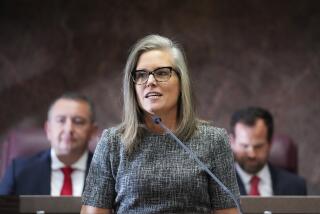Can ‘Private’ Truly Be for Everyone?
- Share via
The naivete surrounding the debate over school vouchers never ceases to amuse me. The notion that working-class parents armed with school vouchers will find private schools affordable is akin to claiming that government grants and scholarships will fully fund a student’s tuition through Stanford.
Despite government grants and scholarships, private colleges still serve a very privileged few when compared to their state-funded university counterparts. What makes anyone think that private elementary and high schools will be any different?
Putting that argument aside, let’s say that the voucher system really did make private institutions viable for most of our public school population. Is that what parents whose children currently attend private schools truly want? If so, one has to wonder if they understand what the term “private” means.
If vouchers will truly result in equal access to education--private or public--for all students then I’m all for them, particularly if suburban private schools intend to use the voucher system to meet the needs of teens at risk. Why should public schools solely shoulder the burden of coping with the growing number of students for whom violence, substance abuse and sexual promiscuity predominate?
Wealthy parents have always had the option to place their child who exhibits antisocial behavior in private school as a means of “straightening him or her up.” Now, with the promise of vouchers, presumably working class parents would be able to do the same.
Proponents of vouchers are fond of citing polls that show that parents who believe the public system isn’t serving their child’s needs are eager to have an opportunity to allow private schools to succeed where public schools have failed. Yet more often than not, many private schools dump their less than successful students into the public system. Maybe with vouchers, turnabout will be fair play.
If vouchers truly are about equal access, I can envision public schools utilizing private schools as much needed alternative placement centers. Of course private schools, many of which are already overcrowded, can’t begin to meet the needs of most of America’s children. However, as these schools expand to attract more voucher dollars to their programs, these options may indeed become available.
I wonder, though, how this competition for voucher revenues will affect the overall climate of many local private schools. What will happen to private schools if they become dependent on government subsidies? (Make no mistake: A flat-rate voucher taken from the public purse funded by every American taxpayer and then given to every family with school-age children regardless of income is a government subsidy.)
With that in mind, what will private schools be required to render unto Caesar, if they take his vouchers? Many parents who opt for private schools do so because they want to remove their child from that public school “element.” With a voucher system in place, those same parents may find it hard to distinguish public from private.
Driving just about every educational code requirement is a group of concerned taxpaying parents. How will private schools respond to empowered voucher-waving parents who now have access to their programs?
If vouchers truly create a level playing field, where all participates have to play by the same rules, then we in public education are more than capable of taking on the competition. But something tells me that isn’t what voucher advocates have in mind.






